『武士道 Bushido 』-新渡戸稲造(Inazo Nitobé)-
Chapter 10
(Education and Training of a Samurai 武士は何を学びどう己を磨いたか)
Bushido, the Soul of Japan by Inazo Nitobe
[Book]
[reading]
・Chapter TOP 新渡戸稲造(Inazo Nitobé)TOP
・Chapter 00(Prefaces 序文)
・Chapter 01(Bushido as an Ethical System 武士道とは)
・Chapter 02(Sources of Bushido 武士道の源)
・Chapter 03(Rectitude or Justice 「義」)
・Chapter 04(Courage, the Spirit of Daring and Bearing 「勇」)
・Chapter 05(Benevolence, the Feeling of Distress 「仁」)
・Chapter 06(Politeness 「礼」)
・Chapter 07(Veracity or Truthfulness 「誠」)
・Chapter 08(Honor 「名誉」)
・Chapter 09(The Duty of Loyalty 「忠義」)
・Chapter 10(Education and Training of a Samurai 武士は何を学びどう己を磨いたか)
・Chapter 11(Self-Control 人に勝ち己に勝つために)
・Chapter 12(The Institutions of Suicide and Redress 「切腹」)
・Chapter 13(The Sword, the Soul of the Samurai 「刀」)
・Chapter 14(The Training and Position of Woman 武士道が求めた女性の理想像)
・Chapter 15(The Influence of Bushido 「大和魂」)
・Chapter 16(Is Bushido Still Alive? 武士道は蘇るか)
・Chapter 17(The Future of Bushido 武士道から何を学ぶか)
・[修養]、
・[自警録]
EDUCATION AND TRAINING OF A SAMURAI (read 10)
(朗読、Read)
were conducted accordingly.
The first point to observe in knightly pedagogics was to build up character, leaving in the shade the subtler faculties of prudence, intelligence and dialectics. We have seen the important part aesthetic accomplishments played in his education. Indispensable as they were to a man of culture, they were accessories rather than essentials of samurai training. Intellectual superiority was, of course, esteemed; but the word Chi, which was employed to denote intellectuality, meant wisdom in the first instance and placed knowledge only in a very subordinate place. The tripod that supported the framework of Bushido was said to be Chi, Jin, Yu, respectively Wisdom, Benevolence, and Courage. A samurai was essentially a man of action. Science was without the pale of his activity. He took advantage of it in so far as it concerned his profession of arms. Religion and theology were relegated to the priests; he concerned himself with them in so far as they helped to nourish courage. Like an English poet the samurai believed "'tis not the creed that saves the man; but it is the man that justifies the creed." Philosophy and literature formed the chief part of his intellectual training; but even in the pursuit of these, it was not objective truth that he strove after,—literature was pursued mainly as a pastime, and philosophy as a practical aid in the formation of character, if not for the exposition of some military or political problem.
From what has been said, it will not be surprising to note that the curriculum of studies, according to the pedagogics of Bushido, consisted mainly of the following,—fencing, archery, jiujutsu or yawara, horsemanship, the use of the spear, tactics, caligraphy, ethics, literature and history. Of these, jiujutsu and caligraphy may require a few words of explanation. Great stress was laid on good writing, probably because our logograms, partaking as they do of the nature of pictures, possess artistic value, and also because chirography was accepted as indicative of one's personal character. Jiujutsu may be briefly defined as an application of anatomical knowledge to the purpose of offense or defense. It differs from wrestling, in that it does not depend upon muscular strength. It differs from other forms of attack in that it uses no weapon. Its feat consists in clutching or striking such part of the enemy's body as will make him numb and incapable of resistance. Its object is not to kill, but to incapacitate one for action for the time being.
A subject of study which one would expect to find in military education and which is rather conspicuous by its absence in the Bushido course of instruction, is mathematics. This, however, can be readily explained in part by the fact that feudal warfare was not carried on with scientific precision. Not only that, but the whole training of the samurai was unfavorable to fostering numerical notions.
Chivalry is uneconomical; it boasts of penury. It says with Ventidius that "ambition, the soldier's virtue, rather makes choice of loss, than gain which darkens him." Don Quixote takes more pride in his rusty spear and skin-and-bone horse than in gold and lands, and a samurai is in hearty sympathy with his exaggerated confrère of La Mancha. He disdains money itself,—the art of making or hoarding it. It is to him veritably filthy lucre. The hackneyed expression to describe the decadence of an age is "that the civilians loved money and the soldiers feared death." Niggardliness of gold and of life excites as much disapprobation as their lavish use is panegyrized. "Less than all things," says a current precept, "men must grudge money: it is by riches that wisdom is hindered." Hence children were brought up with utter disregard of economy. It was considered bad taste to speak of it, and ignorance of the value of different coins was a token of good breeding. Knowledge of numbers was indispensable in the mustering of forces as well, as in the distribution of benefices and fiefs; but the counting of money was left to meaner hands. In many feudatories, public finance was administered by a lower kind of samurai or by priests. Every thinking bushi knew well enough that money formed the sinews of war; but he did not think of raising the appreciation of money to a virtue. It is true that thrift was enjoined by Bushido, but not for economical reasons so much as for the exercise of abstinence. Luxury was thought the greatest menace to manhood, and severest simplicity was required of the warrior class, sumptuary laws being enforced in many of the clans.
We read that in ancient Rome the farmers of revenue and other financial agents were gradually raised to the rank of knights, the State thereby showing its appreciation of their service and of the importance of money itself. How closely this was connected with the luxury and avarice of the Romans may be imagined. Not so with the Precepts of Knighthood. These persisted in systematically regarding finance as something low—low as compared with moral and intellectual vocations.
Money and the love of it being thus diligently ignored, Bushido itself could long remain free from a thousand and one evils of which money is the root. This is sufficient reason for the fact that our public men have long been free from corruption; but, alas, how fast plutocracy is making its way in our time and generation!
The mental discipline which would now-a-days be chiefly aided by the study of mathematics, was supplied by literary exegesis and deontological discussions. Very few abstract subjects troubled the mind of the young, the chief aim of their education being, as I have said, decision of character. People whose minds were simply stored with information found no great admirers. Of the three services of studies that Bacon gives,—for delight, ornament, and ability,—Bushido had decided preference for the last, where their use was "in judgment and the disposition of business." Whether it was for the disposition of public business or for the exercise of self-control, it was with a practical end in view that education was conducted. "Learning without thought," said Confucius, "is labor lost: thought without learning is perilous."
When character and not intelligence, when the soul and not the head, is chosen by a teacher for the material to work upon and to develop, his vocation partakes of a sacred character. "It is the parent who has borne me: it is the teacher who makes me man." With this idea, therefore, the esteem in which one's preceptor was held was very high. A man to evoke such confidence and respect from the young, must necessarily be endowed with superior personality without lacking erudition. He was a father to the fatherless, and an adviser to the erring. "Thy father and thy mother"—so runs our maxim—"are like heaven and earth; thy teacher and thy lord are like the sun and moon."
The present system of paying for every sort of service was not in vogue among the adherents of Bushido. It believed in a service which can be rendered only without money and without price. Spiritual service, be it of priest or teacher, was not to be repaid in gold or silver, not because it was valueless but because it was invaluable. Here the non-arithmetical honor-instinct of Bushido taught a truer lesson than modern Political Economy; for wages and salaries can be paid only for services whose results are definite, tangible, and measurable, whereas the best service done in education,—namely, in soul development (and this includes the services of a pastor), is not definite, tangible or measurable. Being immeasurable, money, the ostensible measure of value, is of inadequate use. Usage sanctioned that pupils brought to their teachers money or goods at different seasons of the year; but these were not payments but offerings, which indeed were welcome to the recipients as they were usually men of stern calibre, boasting of honorable penury, too dignified to work with their hands and too proud to beg. They were grave personifications of high spirits undaunted by adversity. They were an embodiment of what was considered as an end of all learning, and were thus a living example of that discipline of disciplines,
Read文献、
book文献
TOP
日本の魂ー日本思想の解明ー
日本的思考の根源を見る。
”忠義”は追従ではない。”名誉”は求める心である。
(第三章 義-あるいは正義について)
サムライにとって、 卑怯な行動や不正な行動ほど恥ずべきものはない。
(第九章 忠義)
武士道は、われわれの良心を主君の奴隷となすべきことを要求しなかった
(第十章 武士の教育)
武士道は経済とは正反対のものである。それは貧しさを誇る。
(第十一章 克己)
心の奥底の思いや感情—特に宗教的なもの—を雄弁に述べ立てることは、日本人の間では、それは深遠でもなく、 誠実でもないことの疑いないしるしだと受け取られた。
(第十四章 女性の教育と地位)
妻がその夫、家庭そして家族のために身を捨てることは、男が主君と国のために身を捨てるのと同様、自発的かつみごとになされた。
|
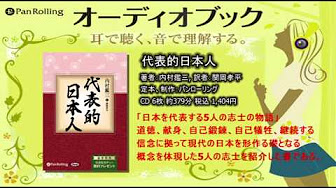
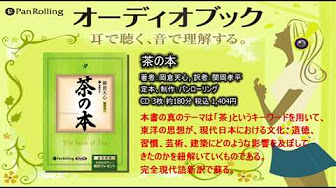
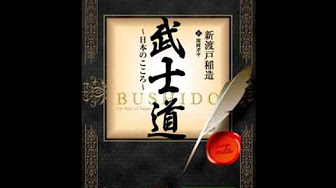
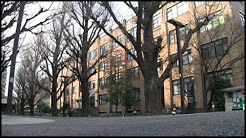

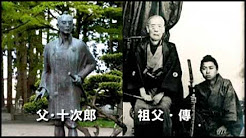
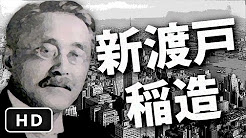
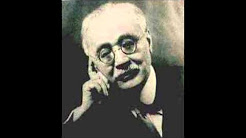



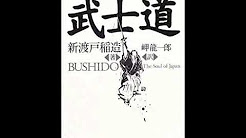
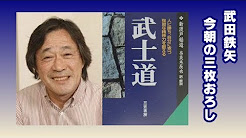
・新渡戸稲造
第1弾「世界を結ぶ『志』~新渡戸稲造の生涯~」、
第2弾「未来につながる『道』~新渡戸稲造の武士道~」、
第3弾「すべてに根ざす『愛』~新渡戸稲造の苦悩~」、
・ 新渡戸稲造の至極の名言集
・「新渡戸稲造の名言」20話
| |
・Bushido: The Soul of Japan by Inazo Nito(1-18)
・Bushido: The Soul of Japan by Inazo Nitobe(1-18)
・武士道「BUSHIDO」Japanese Ver.
・≪AI朗読≫武士道
・【武田鉄矢】『武士道』完全版
|

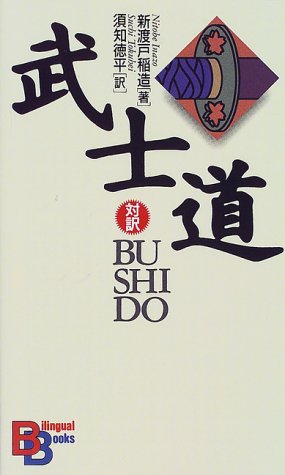
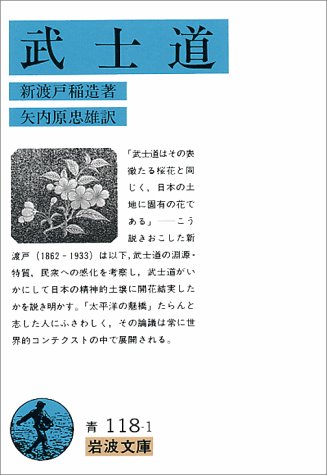
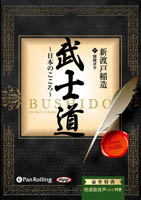 朗読,Read 朗読,Read
|
















 朗読,Read
朗読,Read
















 朗読,Read
朗読,Read